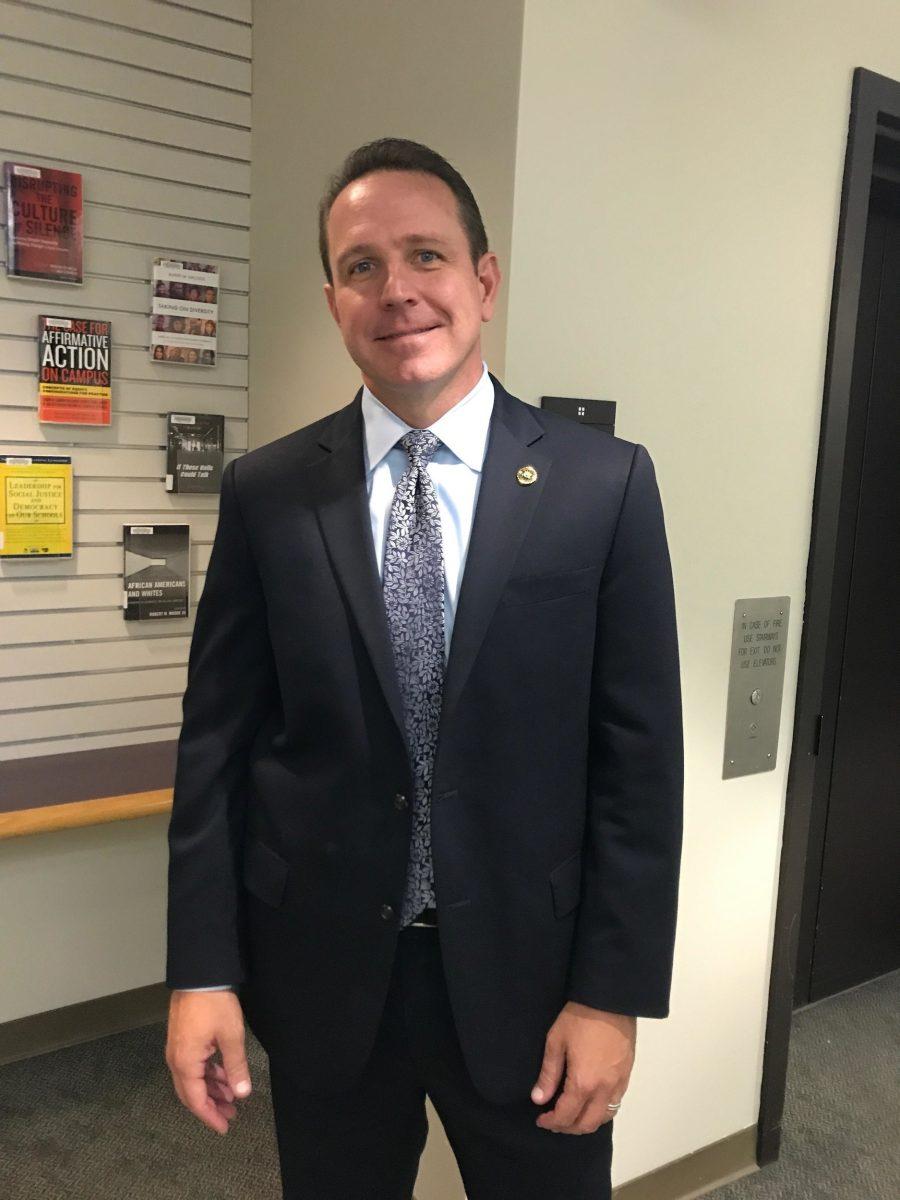Craig Fair, Assistant Deputy Special Agent in Charge addressed Sonoma State criminal justice major students on September 8 to talk about community outreach to spread the mission statement of the Federal Bureau of Investigation, as well as to urge outstanding students to apply to be agents. The talk was interesting and extremely eye opening not only for students, but also for criminal justice professor Michael Hooper, who said, “I wanted the students to get a sense for the mission and priorities of the FBI as well as the importance of community outreach in duty performance.”
Deputy Fair explained at the beginning of his talk, “I was 19, in college in the East Coast when an FBI recruiter came in to talk to us. He explained what the FBI did and that was it for me, I was hooked.” He aspired to be in the FBI since he was in college and recognized that he had to make many sacrifices that other college students perhaps did not have to make but he explained his job to be, “the best job in the world.”
His passion for domestic tranquility and overall safety within the United States aspired criminal justice majors in the room to become part of the Federal Bureau of Investigation.
“That was a really eye-opening experience because not many people get to meet a real FBI agent.” Jake Bassette, a senior criminal justice major at Sonoma State, said.
Fair has worked in the FBI for 22 years, and he explained to students that being in the FBI required a lot of discipline and sacrifice. He urged those who may be interested in applying to become agents to make careful choices during their lives.
He said, “I had to disassociate from a softball team once because the guys were a little too rowdy, and I could not be associated with such behavior.” This highlighted the rigorous application process that the FBI puts applicants through before handing them a badge and a gun.
Hearing Fair talk about his job being extremely important and rewarding; he made people in the room understand why he made so many sacrifices to be in the FBI. Professor Michael Hooper said, “What I found most impressive was the degree to which he was enthusiastic about the intrinsic value in the work he and his colleagues perform.”
Both students and the professor found that the talk was extremely informational and relevant to the work that criminal justice majors were studying.
Professor Michael Hooper explained the process of getting Fair to come to Sonoma State “I had heard Deputy Special Agent in Charge Fair on a KCBS radio program discussing community outreach and thought having him address the students in my CCCS 407 class on the subject would be highly informative,” he said.
Fair was initially hired as a surveillance specialist for the FBI and his main task was to follow wannabe Jihadis in New York. He described his job as hard, exciting and truly rewarding. “I wake up with one thing in mind everyday and that is domestic safety,” he said. Shortly after that job he attended the FBI academy in Quantico where he trained to be an agent for 22 weeks.
After his time in Quantico he was transferred to the San Francisco Counterterrorism division where he was in charge of operations all the way from Carmel to the California-Oregon border.
“San Francisco is one of the busiest division in counter terrorism,” Fair said. “Silicon Valley is a hotbed for economic espionage.” He further explained that the Chinese, and many others, are after American technological advancements. That could be anything from actual coding for programs, to genetically modified rice that could help the Chinese rice market.
Fair also address how the FBI is portrayed. “The media in today’s age sometimes shows footage of the action sho,t but it fails to show what led up to the action or the thought process that many officers and agents go through,” Fair said. But, “you’ve got to embrace the media, they want to get the story right…policing issues are extremely difficult.”
He explained that many media outlets are willing to put a story out without contacting them first and that can make the public misinterpret the situation. “Perceptions and misperceptions all get mashed into a cloud of optics,” Fair said. His community outreach efforts are attempting to counter the idea that lives amongst many U.S. citizens that the FBI is bad stuff. “I’m going to keep my effort to counter the narrative,” Fair said.





![[Both photos courtesy of sonoma.edu]
Ming-Ting Mike Lee stepped in as the new SSU president following Sakakis resignation in July 2022](https://sonomastatestar.com/wp-content/uploads/2024/04/CC4520AB-22A7-41B2-9F6F-2A2D5F76A28C-1200x1200.jpeg)


























